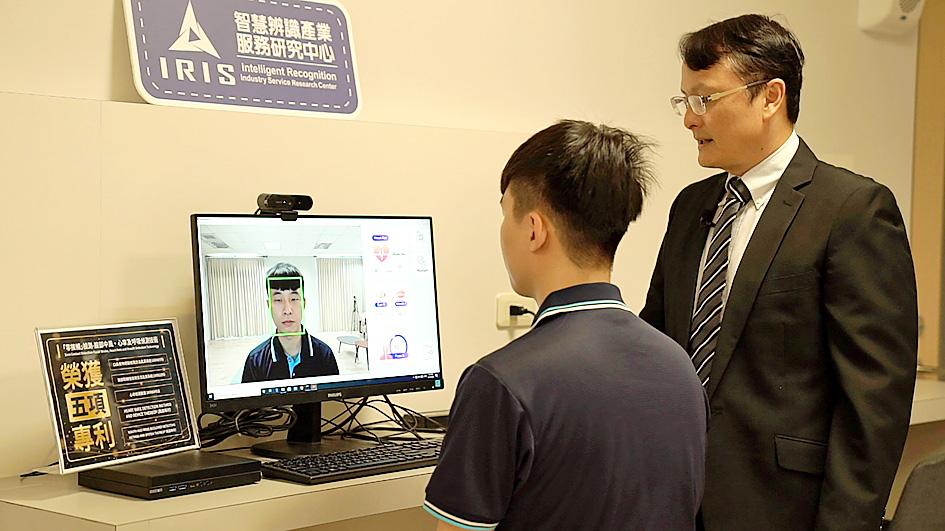Taiwan last week topped the medal table at a global invention competition, finishing with a total of 45, Taiwan’s Chinese Innovation and Invention Society said yesterday.
At the annual International Salon of Inventions and New Technologies on Monday last week, Taiwan won 31 gold medals, 11 silver and three bronze, with inventions ranging from sports applications to healthcare devices, the society said.
While Taiwan bagged fewer medals than last year’s 50, its gold medal count increased to 31, compared with last year’s 29, and the nation finished at the top of the table with 45 medals, it said.

Photo: CNA
One of Taiwan’s inventions that won gold was a healthcare device that Matthew Ma (馬惠明), vice superintendent of National Taiwan University Hospital’s Yunlin branch helped to develop, the society said.
Without contact, the detection device monitors a person’s heart rate and breathing via a camera, with sensors transmitting data to an artificial intelligence center that analyzes their condition, it said.
Another notable entry to the virtual contest in Crimea, Ukraine, was a sports training device invented by a university team that was led by retired Taiwanese basketball player Hsu Chih-chao (許智超), who was once the nation’s top midrange shooter in the Super Basketball League.
The device can be used for a range of sports, serving as a warm-up machine for competing athletes or a training device for weightlifters, for example, said Hsu, who now teaches at Hungkuo Delin University of Technology.
The contest typically draws contestants from across the globe and lasts several days, with the submissions displayed at exhibition centers, but, due to COVID-19, this year’s event was held virtually on one day in Sevastopol, the society said.

The Grand Hotel Taipei on Saturday confirmed that its information system had been illegally accessed and expressed its deepest apologies for the concern it has caused its customers, adding that the issue is being investigated by the Ministry of Justice Investigation Bureau. The hotel said that on Tuesday last week, it had discovered an external illegal intrusion into its information system. An initial digital forensic investigation confirmed that parts of the system had been accessed, it said, adding that the possibility that some customer data were stolen and leaked could not be ruled out. The actual scope and content of the affected data

‘LIKE-MINDED PARTNER’: Tako van Popta said it would be inappropriate to delay signing the deal with Taiwan because of China, adding he would promote the issue Canadian senators have stressed Taiwan’s importance for international trade and expressed enthusiasm for ensuring the Taiwan-Canada trade cooperation framework agreement is implemented this year. Representative to Canada Harry Tseng (曾厚仁) in an interview with the Central News Agency (CNA) said he was increasingly uneasy about Ottawa’s delays in signing the agreement, especially as Ottawa has warmed toward Beijing. There are “no negotiations left. Not only [is it] initialed, we have three versions of the text ready: English, French and Mandarin,” Tseng said. “That tells you how close we are to the final signature.” Tseng said that he hoped Canadian Prime Minister Mark Carney

POSITIVE DEVELOPMENT: Japan and the US are expected to hold in-depth discussions on Taiwan-related issues during the meeting next month, Japanese sources said The holding of a Japan-US leaders’ meeting ahead of US President Donald Trump’s visit to China is positive news for Taiwan, former Japan-Taiwan Exchange Association representative Hiroyasu Izumi said yesterday. After the Liberal Democratic Party’s landslide victory in Japan’s House of Representatives election, Japanese Prime Minister Sanae Takaichi is scheduled to visit the US next month, where she is to meet with Trump ahead of the US president’s planned visit to China from March 31 to April 2 for a meeting with Chinese President Xi Jinping (習近平). Japan and the US are expected to hold in-depth discussions on Taiwan-related issues during the

President William Lai (賴清德) yesterday bestowed one of Taiwan’s highest honors on Saint Vincent and the Grenadines (SVG) Ambassador Andrea Clare Bowman in recognition of her contributions to bilateral ties. “By conferring the Order of Brilliant Star with Grand Cordon on Ambassador Bowman today, I want to sincerely thank her, on behalf of the Taiwanese people, for her outstanding contribution to deepening diplomatic ties between Taiwan and SVG,” Lai said at a ceremony held at the Presidential Office in Taipei. He noted that Bowman became SVG’s first ambassador to Taiwan in 2019 and